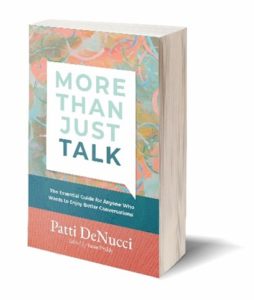Nothing puts the brakes on our desire to start conversations and connect with others quite like fear. And there are many flavors of social fear from which to choose. Fear of any type of social engagement, especially with people we don’t know. Fear that comes from not knowing what to say to get (and keep) a conversation going. Fear of the possible awkwardness (or conflict) that might occur. Fear of being seen as less-than, imperfect, uninformed, or unworthy. Fear of being our true selves. Fear of rejection or not fitting in. The list goes on and on.
Recognize any of them? Have a few social fears of your own?
In the spirit of transparency, imperfection, and vulnerability, allow me to offer a few of my social fears. Fear of getting stuck in boring, one-sided, or aggressive conversations that drain my energy and waste my time. Fear of sales-pitchy B.S. (and then the fear of actually falling for it). Fear of being boring and irrelevant. Fear of being misunderstood or not heard at all. Fear of putting my foot in my mouth. Fear that I’m not a very good listener. Oh, and the Big One: fear of not being liked. (You’d think that at my age – never mind what it is – I’d be over that last one. I’m not. It feels good to be liked.)
I’m afraid these fears make me a very imperfect networker and conversationalist! But I still love and need socializing / networking / conversing, both with friends and strangers. It cheers, energizes, validates, and “feeds” me. Literally and metaphorically. I’ve been fascinated with socialization all my life. I’ve seen how beneficial it is for our health, happiness and success. And I love teaching others about it, thus the teacher is the perpetual student.

Photo by Samuel Austin on Unsplash
Why people hesitate or are afraid to connect, as well as the topics of authenticity and imperfection, have been on my mind a lot lately. So, naturally, lessons related to these have been revealing themselves to me everywhere I turn.
Fear can stop us from doing dangerous, foolhardy things. But, fear is also a conniving little poser that likes to mess with us, tell us lies, paralyze us, distract us, and lead us down ridiculous paths. Fear ultimately tries to stop us from participating in life, being who we are meant to be, finding happiness and success, and connecting genuinely and meaningfully.
If we recognize this, we can outsmart fear. We might even see fear as a worthy opponent that arouses our defiance, resolve, and courage (a word derived from the Latin word for “heart”). These forces might then tap us on the shoulder and say encouragingly, “You know you can do this if you just set your mind to it and give it a try.”
Or our inner forces may see the need to crank things up a bit. They may poke us firmly in the sternum, and yell, “Hey!! Snap out of it! You’re better than this! You deserve more. Come on! Show ’em what you got! Even if you or what you have to say are imperfect.”
Related to this, I recently read Peggy Noonan’s book “On Speaking Well” while traveling to and from a speaking engagement. I have always admired Noonan’s writing, and she’s definitely written and heard her share of speeches. I knew I could learn something from her experience, stories, and wisdom. One of the questions Noonan brings up in her book is this: Why do speakers (as well as award recipients and honorees) fill their introductions with long, boring lists of their awards, accomplishments, and successes? These, when read, cause most audience members to drift into a glazed state of boredom. The “I’m-so-accomplished-smart-and-wonderful” tone of most introductions creates distance, not connection.
Wouldn’t it be far more intriguing — endearing, even — if speaker introductions included at least a few of the person’s missteps and failures? Not the terrible ones that could leave the audience cringing. But the goof-ups that shaped their (good) character, taught them (valuable) life and business lessons, and show that the speaker has a sense of humility and humor? Thats what connects people. (Tomorrow you will find me at my desk rewriting my speaker introduction. Just saying.)
I found this concept intriguing. We could apply this concept to conversations, too. Wouldn’t it be great if we could connect more meaningfully and more immediately by sharing our mistakes and failures – and what they taught us – rather than our latest triumphs? I had a coffee meeting recently with a very successful friend and we did this. I shared one of my disaster stories. He shared his. We both got the lessons. Two for one. Another friend and I enjoyed dinner recently and she said she was so relieved that at “our age” people are beginning to be more real and genuine. Maybe it’s a phase of life. If so, I’m loving it.
While giving a mini-workshop on public speaking to a group of emerging leaders at a conference, I quoted fellow speaker and speaking coach, Allison Shapira: “The less you try to be impressive, the more impressive you are.” That is the ironic truth and it fits in here nicely.
With that, I believe I’ve taken this highly imperfect (but hopefully interesting and helpful) post full circle and assure you that not only is it okay to be imperfect, it’s our natural human condition and we should own it. Imperfection and authenticity are nothing to be feared or avoided. In fact, these traits are endearing and desirable, and they actually work in your favor when building relationships.
My final assignment for you: Next time you are in a social situation, see if being even a little more authentic, imperfect, and vulnerable shifts the mood, depth, and value of the conversation. Share something you’re working through or struggling with. Ask for ideas, input, or possible solutions. Tell a story about a goof-up you made and what you learned from it. Maybe that goof-up is actually funny at this point. Let others know what you really think and how you feel (diplomatically, of course – I’m not giving you permission to be unkind or offensive). I’d love to hear how it goes and what the results are!
—————————————–
Considering some professional development for your team or need a presenter for an upcoming event? Let’s have a conversation and figure out how we can work together! Email me at patti[at]intentionalnetworker[dot]com



Nice, Patti. Good words. Good advice.
Gracias, Ms. Jeanne! Always love that you read my work as you have a thoroughappreciation of what it takes to write!